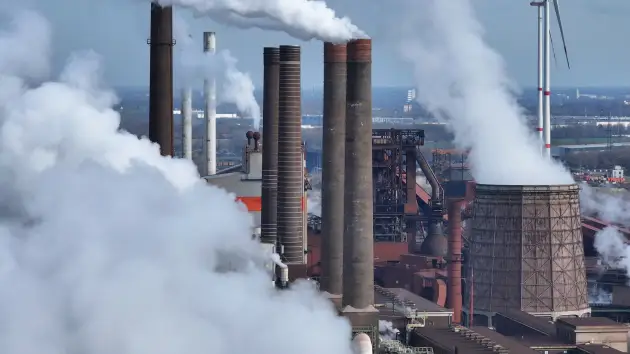Estimated reading time: 3 minutes
A “phase out” commitment would likely require a shift away from fossil fuels until their use is eliminated, while a “phase down” could indicate a reduction in their use — but not an absolute end.
A fight over the future of fossil fuels has been thrust into the global spotlight at the COP28 climate summit.
For nearly three decades, policymakers representing nearly 200 countries at the U.N.’s annual climate conference have failed to meaningfully address the chief driver of the climate crisis: the burning of coal, oil, and gas.
Many gathering in Dubai for COP28 believe the talks can only be considered a success if they result in a deal to “phase out” all fossil fuels.
The language of the final agreement, expected by or around Dec. 12, will be closely monitored. A “phase out” commitment would likely require a shift away from fossil fuels until their use is eliminated, while a “phase down” could indicate a reduction in their use — but not an absolute end.
There’s also a debate about whether an agreement should center on “abated” fossil fuels, which are trapped and stocked with carbon capture and storage technologies. “Unabated” fossil fuels are largely understood to be produced and used without substantial reductions in the amount of emitted greenhouse gases.
Johan Rockstrom, director of the Potsdam Institute for Climate Impact Research and one of the world’s most influential Earth scientists, told CNBC that there is no doubt that COP28 “has to be the mitigation COP.”
“The outcome of COP28 must be that all the oil, gas, and coal nations of the world see that now we are truly at the beginning of the end of the fossil fuel era for the world economy. And that we are now starting to bend the curve, properly,” he said.
“It is only that that will count whether COP28 is a success,” he continued. “Everything else will follow. So, of course, it is good to make progress on loss and damage, Article 6, financing, adaptation, nature, agriculture, and water, but it is all following from whether or not we make progress on the fossil fuel phase-out.”
A draft text published in the early hours of Friday appeared to raise the prospect that world leaders could sign off on a deal that would “phase out” all fossil fuels. Other scenarios, however, include the option to “phase down” hydrocarbons, to only focus on coal — or to make no mention of fossil fuels whatsoever.
Not everyone is on board with calls for a phase-out. Russia has said it would oppose this language being used in the final agreement, while the COP28 host the United Arab Emirates has signaled its preference for a phase-down.
Big Oil, too, is pushing for a shift of focus away from calls to phase out fossil fuels. Exxon Mobil CEO Darren Woods told CNBC on Saturday that society should instead prioritize reducing emissions, which he described as the “true problem.”
‘This year is different’
In an unprecedented start to proceedings on Thursday, delegates at COP28 sealed the details of a landmark deal to help the world’s most vulnerable countries pay for the impacts of climate disasters.
The operationalization of the so-called loss and damage fund was hailed as a welcome breakthrough and helped to clear the way for policymakers to negotiate on other major issues.
“Now we don’t have an agenda fight [and] we don’t have a loss and damage fight, it opens up a space for us to have a big fossil fuel fight,” said Catherine Abreu, founder of the Destination Zero network of nonprofits working on climate issues.
It is “important to say that more fossil fuels equal more loss and damage, so these two issues are quite intertwined,” she added. (https://www.nbcnews.com/science/environment/fossil-fuel-fight-takes-center-stage-cop28-climate-summit-rcna127975)


































